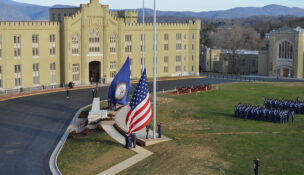Alexandria arena proposal economic impact report released
Up to $8B in annual economic benefit forecast for state
Kate Andrews //February 16, 2024//

Rendering of a potential $2 billion, 9 million-square-foot entertainment complex that would include a new arena for the Washington Capitals and Washington Wizards teams, overlooking the Potomac River in Alexandria

Rendering of a potential $2 billion, 9 million-square-foot entertainment complex that would include a new arena for the Washington Capitals and Washington Wizards teams, overlooking the Potomac River in Alexandria
Alexandria arena proposal economic impact report released
Up to $8B in annual economic benefit forecast for state
Kate Andrews //February 16, 2024//
An economic and fiscal impact analysis released Friday by the Alexandria Economic Development Partnership forecasts that the proposed Washington Capitals and Wizards arena in Alexandria could generate up to $7.96 billion in annual economic output for the state. Additionally, the report says the arena could be completed as soon as 2028 if its construction schedule is accelerated.
Opposed by some Democratic state lawmakers and Alexandria civic groups, the proposed 933,000-square-foot arena would be part of a 9.43 million-square-foot, $2 billion sports and entertainment complex.
As with many economic and fiscal impact reports generated on behalf of localities and economic development authorities, the report issued Friday was fairly rosy, with no negative financial risks included in its options — just lower benefits if the arena is delayed by a year to 2029 under the slower schedule. The report included only financial benefits and costs to the city and state, and did not include Capitals and Wizards owner Monumental Sports & Entertainment‘s estimated benefits and costs.
According to the analysis, conducted by HR&A Advisors, the project could create between 345 and 2,535 construction jobs in Alexandria — depending on the construction schedule — and 2,380 construction jobs or up to 17,645 jobs in phase one. If the arena is built on a slower schedule, it would be finished in 2029, along with a music venue, arena parking garage, Wizards team facility and an office building.
Ongoing jobs created during phase one at the arena and other buildings would include 9,190 jobs in Alexandria under the 2029 completion schedule, HR&A estimates. If finished by 2028, the report anticipates 29,555 permanent statewide jobs, including 12,330 in Alexandria, echoing what Gov. Glenn Youngkin said in his December 2023 announcement of the proposal, calling it an opportunity to create up to 30,000 jobs for the state.
As for annual permanent labor income, the 2029 completion plan anticipates $2.387 billion, or $2.847 billion if the arena’s finished by 2028, and between $3.531 billion and $7.96 billion in annual economic impact.
The Alexandria Economic Development Partnership hosted a media question-and-answer session and report overview Friday morning with the HR&A researcher involved in producing the report in attendance, as well as a JBG Smith Properties representative and Monica Dixon, Monumental’s president of external affairs and chief administrative officer. The Zoom press briefing was held on background, restricting reporters from quoting participants.
Reporters asked why the Q&A was on background, as well as questions about job numbers and possible “doomsday scenarios,” in which public costs could outstrip tax revenue of the project.
The net fiscal impact on the state, the report estimates, could reach $760.6 million total over 30 years in the accelerated building schedule, or $187.5 million in the slower scenario. That includes one-time construction impacts, as well as sales-and-use tax spending, business and personal income taxes and hotel taxes. The report anticipates a 10% admissions (ticket) tax on arena and performance venue events, which Washington, D.C., does not charge.
Monumental hired CSL International in 2023 to develop a business model related to the operations of a new arena, according to the report. CSL estimates the arena can hold as many as 221 events annually, up from Capital One Arena’s average of 216 events annually pre-pandemic, including a high of 228 events in 2018.
According to HR&A’s report, the arena’s operational costs would reach $292 million annually in its first year, 2028, under the faster schedule. That would include $248 million in stadium operations, with the remainder of the budget going toward headquarters operations and performing arts.

Some numbers in the report were redacted for public release, including estimated annual retail sales at the existing Potomac Yard shopping center in 2023, and proposed parking, limited service and sports retail revenues per game, although the total spending is $116 million per game, according to Monumental.
HR&A Advisors was hired in June 2023 by Alexandria Economic Development Partnership to conduct an economic and fiscal impact analysis of the arena development, according to the analysis provided Friday. HR&A, the report notes, was not involved with discussion of underwriting or financing of the project, or non-tax revenue that could result, such as parking revenue from a publicly owned garage, or naming rights.
The revenue projections were extrapolated to 2063, at the same growth rate to match Monumental Sports & Entertainment’s contemplated lease term with state authority.
Alexandria civic groups opposing public funds for the project and anticipated traffic and infrastructure pressures were not appeased by the released report.
“This still isn’t the transparency we have called for,” said Brian Hess, an Alexandria-based lobbyist and nonprofit executive director who leads the Sports Fans Coalition, which previously pushed back against public funding of a proposed Washington Commanders stadium in Virginia. “They have redacted significant pieces of information that leaves their conclusions dubious at best — especially when D.C.’s released report says almost the opposite. Economic consensus still says these kinds of deals don’t work, and nothing about this report suggests this arena will be the exception.”
Andrew Macdonald, a former vice mayor for the City of Alexandria who is part of the Coalition to Stop the Arena at Potomac Yard, said in a statement that he wonders “why has it taken the city until now to release this report, such as it is. It talks a lot about ‘economic output’ but very little about revenue projections.
“There is still a lot we don’t know,” Macdonald added. “The real economic benefits and costs are still unclear. There should be an independent cost-benefit analysis of the project, and the public should be able to review it and decide if they want any arena in Virginia. The commonwealth also needs to release any economic studies they have. We still don’t have all the information we need. This bill should not be passed by the General Assembly.”
Among the endorsements of the project following the release of the economic analysis was the Virginia Economic Developers Association (VEDA), which represents more than 600 economic development professionals in the state.
“We place great weight on the approval process utilized for this project by the General Assembly’s Major Employment and Investment (MEI) commission,” VEDA President Linda Green, vice president of economic development at the Danville-based Institute for Advanced Learning and Research, said in a statement. “The benefits of a project of this size will be felt well beyond the region, and we believe the entire commonwealth will benefit from this influx of jobs, revenue, and economic opportunity in Virginia.”
Meanwhile, according to a Washington Post report, the arena plan is stripped from one version of the state budget under consideration in the Virginia General Assembly. The state Senate would also have to approve a House-originated bill to authorize creation of the state authority for the arena project, which would shoulder $1.35 billion of the project’s $2 billion cost with bonds.
The project has been fiercely opposed by some Alexandria residents, and some Senate Democrats — including Sen. Louise Lucas, chair of the powerful Senate Finance Committee — have voiced wariness and opposition to the project, particularly over the possible risk to public funds.
Opponents say that the public bonds of more than $1 billion to fund the project — anticipated to be repaid by tax revenue generated by the arena and other businesses — could put a burden on Alexandria taxpayers and others in the state, if spending and tax revenue don’t live up to backers’ expectations, which could be caused by unforeseen circumstances such as an economic downturn or another pandemic.
The House-originated bill that would create the arena authority currently includes a reenactment clause. If the wording remains in place when the measure is signed by the governor, the authority bill would have to be voted on and passed a second time in the 2025 session by both legislative bodies for the authority to become law — in effect, delaying work by at least a year on a new arena.
That, said Senate Majority Leader Scott Surovell in an interview this week, “could cause a problem” for Monumental.
t

















